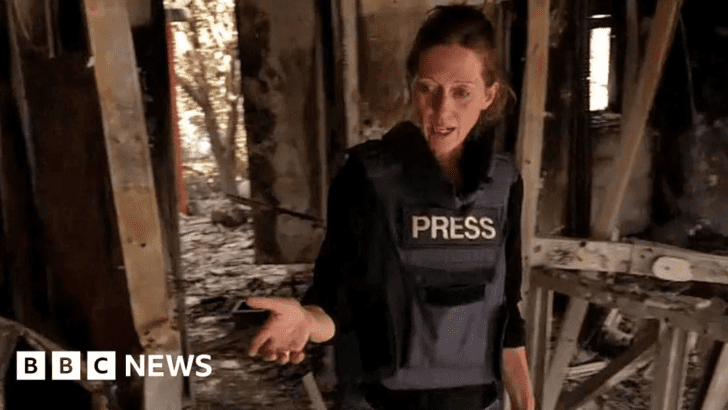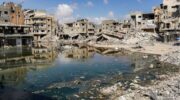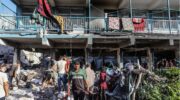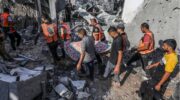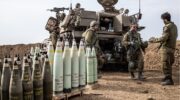It is journalistic malpractice for the media to still be repeating so credulously the Israeli military’s account of that day, including alleged Hamas atrocities that turned out to be fiction
Media neglected to report much key information, e.g. Israeli military commanders had ordered the shelling of kibbutz houses in order to eliminate the “terrorists along with the hostages”… once Israeli special forces arrived: “They eliminated everyone, including the hostages”
Are the images of charred bodies evidence that Israeli civilians and Hamas fighters burned alongside each other, after they were engulfed in flames caused by Israeli shelling of the houses?
While this article focuses on BBC coverage, it’s analysis applies equally to US media. Some news coverage, in fact, has been considerably worse
By Jonathan Cook, reposted from Jonathan Cook Substack, Nov 2, 2023.
The BBC’s Lucy Williamson was taken once again this week to view the terrible destruction at a kibbutz community just outside Gaza attacked on October 7. As we have been shown so many times before, the Israeli homes were riddled with automatic fire, both inside and out. Sections of concrete wall had holes in them, or had collapsed entirely. And parts of the buildings that were still standing were deeply charred. It looked like a small snapshot of the current horrors in Gaza.
There is a possible reason for those similarities – one that the BBC is studiously failing to report, despite mounting evidence from a variety of sources, including the Israeli media. Instead the BBC is sticking resolutely to a narrative crafted for them, and the rest of the western media, by the Israeli military: that Hamas alone caused all this destruction.
Simply repeating that narrative without any caveats has by now reached the level of journalistic malpractice. And yet that is precisely what the BBC does night after night.
Just a cursory look at the wreckage in the various kibbutz communities that were attacked that day should raise questions in the mind of any good reporter. Were Palestinian militants in a position to actually inflict physical damage to that degree and extent with the kind of light weapons they carried?
And if not, who else was in a position to wreak such havoc other than Israel?
A separate question that good journalists ought to be asking is this: What was the purpose of such damage? What did the Palestinian militants hope to achieve by it?
The implicit answer the media is supplying is also the answer the Israeli military wants western publics to hear: that Hamas engaged in an orgy of gratuitious killing and savagery because … well, let’s say the quiet part out loud: because Palestinians are inherently savage.
With that as the implicit narrative, western politicians have been handed a licence to cheerlead Israel as it murders a Palestinian child in Gaza every few minutes. Savages only understand the language of savagery, after all.
Brutal tango
For this reason alone, any journalist who wishes to avoid colluding in the genocide unfolding in Gaza ought to be increasingly wary of simply repeating the Israeli military’s claims about what happened on October 7. Certainly, they should not credulously regurgitate the latest agitprop from the IDF press office, as the BBC is so evidently doing.
What we know from a growing body of evidence gleaned from the Israeli media and Israeli eyewitnesses – carefully laid out, for example, in this report from Max Blumenthal – is that the Israeli military was completely blindsided by that day’s events. Heavy artillery, including tanks and attack helicopters, was called in to deal with Hamas. That appears to have been a straightforward decision in regard to the military bases Hamas had overrun.
Israel has a long-standing policy of seeking to prevent Israeli soldiers from being taken captive – chiefly, because of the high price Israeli society insists on paying to ensure soldiers are returned. For decades, the military’s so-called “Hannibal procedure” has directed Israeli troops to kill fellow soldiers rather than allow them to be taken captive. For the same reason, Hamas expends a great deal of energy in trying to find innovative ways to seize soldiers.
The two sides are essentially engaged in a brutal tango in which each understands the other’s dance moves.
Given Hamas’ situation, effectively managing the Israeli-controlled concentration camp of Gaza, it has limited resistance strategies available to it. Capturing Israeli soldiers maximises its leverage. They can be traded for the release of many of the thousands of Palestinian political prisoners held in jails inside Israel, in breach of international law. In addition, in the negotiations, Hamas usually hopes to win an easing of Israel’s 16-year siege of Gaza.
To avert this scenario, Israeli commanders reportedly called in the attack helicopters on the military bases overwhelmed by Hamas on October 7. The helicopters appear to have fired indiscriminately, despite the risk posed to the Israeli soldiers in the base who were still alive. Israel’s was a scorched-earth policy to stop Hamas achieving its aims. That may, in part, explain the very large proportion of Israeli soldiers among the 1,300 killed that day.
Charred bodies
But what about the situation in the kibbutz communities? By the time the army arrived and was in position, Hamas was well dug in. It had taken the inhabitants as hostages inside their own homes. Israeli eyewitness testimony and media reports suggest Hamas was almost certainly trying to negotiate safe passage back into Gaza, using the Israeli civilians as human shields. The civilians were the Hamas fighters’ only ticket out, and they could be converted later into bargaining chips for the release of Palestinian prisoners.
[YouTube and others are suppressing the video below – see this]
The evidence – from Israeli media reports and eyewitnesses, as well as a host of visual clues from the crime scene itself – tell a far more complex story than the one presented nightly on the BBC.
Did the Israeli military fire into the Hamas-controlled civilian homes in the same fashion as it had fired into its own military bases, and with the same disregard for the safety of Israelis inside? Was the goal in each case to prevent at all costs Hamas taking hostages whose release would require a very high price from Israel?
Kibbutz Be’eri has been a favoured destination for BBC reporters keen to illustrate Hamas’ barbarity. It is where Lucy Williamson headed again this week. And yet none of her reporting highlighted comments made to the Israeli Haaretz newspaper by Tuval Escapa, the kibbutz’s security coordinator. He said Israeli military commanders had ordered the “shelling [of] houses on their occupants in order to eliminate the terrorists along with the hostages”.
That echoed the testimony of Yasmin Porat, who sought shelter in Be’eri from the nearby Nova music festival. She told Israeli Radio that once Israeli special forces arrived: “They eliminated everyone, including the hostages because there was very, very heavy crossfire.”
Are the images of charred bodies presented by Williamson, accompanied by a warning of their graphic, upsetting nature, incontrovertible proof that Hamas behaved like monsters, bent on the most twisted kind of vengeance? Or might those blackened remains be evidence that Israeli civilians and Hamas fighters burned alongside each other, after they were engulfed in flames caused by Israeli shelling of the houses?
Israel will not agree to an independent investigation so a definitive answer will never be forthcoming. But that does not absolve the media of their professional and moral duty to be cautious.
Consider for a moment the stark contrast in the western media’s treatment of events on October 7 and its treatment of the strike on the car park at Al-Ahli Baptist Hospital in northern Gaza on October 17, in which hundreds of Palestinians were reported killed.
In the case of Al-Ahli, the media were only too ready to cast aside all the evidence that the hospital had been hit by an Israeli strike immediately Israel contested the claim. Instead journalists hurriedly amplified Israel’s counter-allegation that a Palestinian rocket had fallen on the hospital. Most of the media moved on after concluding “The truth may never be clear”, or even less credibly, that Palestinian militants were the most likely culprits.
In telling contrast, the western media have not been willing to raise even a single question about what happened on October 7. They have enthusiastically attributed every horror that day to Hamas. They have ignored the reality of utter chaos that reigned for many hours and the potential for poor, desperate and morally dubious decision-making by the Israeli military.
In fact, the media have gone much further. In advancing the narrative of “Hamas as savages”, they have promoted obvious fictions, such as the story that “Hamas beheaded 40 babies”. That piece of fake news was even taken up briefly by US President Joe Biden, before it was quietly walked back by his officials.
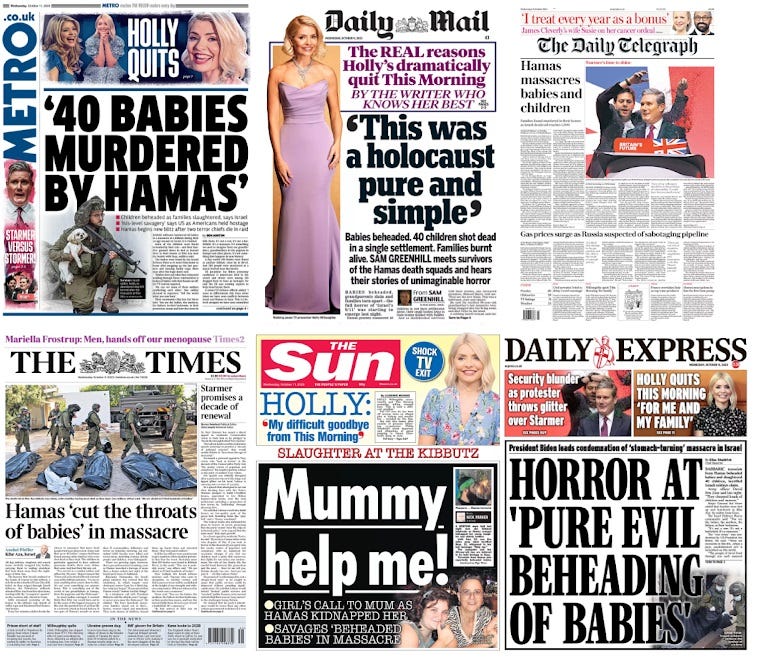
Similarly, it is still a popular throwaway line among the western commentariat that “Hamas carried out rapes”, though once again the allegation is evidence-free so far.
We should be clear. If Israel had serious evidence for either of these claims, it would be aggressively promoting it. Instead, it is doing the next best thing: letting innuendo gently sink into the audience’s subconscious, settling there as a prejudice that cannot be interrogated.
Hamas undoubtedly committed war crimes on October 7 – not least, by taking civilians as human shields. But that kind of crime is one we are familiar with, one “ordinary” enough that the Israel military has been regularly documented carrying it out too. The practice of Israeli soldiers taking Palestinians as human shields goes under various names, such as the “neighbour procedure” and the “early warning procedure”.
Worse atrocities may have happened too, especially given the unexpected scale of Hamas’ success in breaking out of Gaza. Large numbers of Palestinians escaped the enclave, some of them doubtless armed civilians with no connection to the operation. In such circumstances, it would be surprising if there were no examples of the headline-grabbing atrocities being committed.
The issue is whether such atrocities were planned and systematic, as Israel claims and the western media repeats, or examples of rogue actions by individuals or groups. If the latter, Israel would be in no position to judge. Israel’s own history is littered with examples of such crimes, including the documented case of an Israeli army unit taking captive a Bedouin girl in 1949 and repeatedly gang-raping her.
Savagery would certainly not be a uniquely Hamas trait. Following the October 7 attack, videos have been emerging of systematic abuses of any Hamas fighters captured, whether alive or dead. Images show them being beaten and tortured in public for the gratification of onlookers, when there is clearly not even the pretence of information gathering. Others show the bodies of Hamas fighters being defiled and mutilated.
No one can claim the moral high ground here.
What the media’s uncritical promotion of Israel’s “Hamas as savages” narrative has achieved is something sinister – and all too familiar from the West’s long colonial history. It has been used to demonise a whole people, presenting them either as barbarians or as the willing protectors and enablers of barbarism.
The “savages” narrative is being weaponised by Israel to justify its mounting campaign of atrocities in Gaza. Which is why it is so important that journalists don’t simply allow themselves to be spoonfed. Far too much is at stake.
Hamas committed war crimes on October 7 on a scale that is unprecedented for any Palestinian group. But there is little more than Israeli narrative spin so far to suggest that there was an unparalleled depravity to Hamas’ actions. Certainly from what we know, it is hard to see that anything Hamas did that day was worse, or more savage, than what Israel has been doing daily in Gaza for weeks.
And Israel’s actions – from bombing Palestinian families to starving them of food and water – has the blessing of every major western politician.
Jonathan Cook is an independent British journalist who has covered the Israel-Palestine beat for 20+ years. He is a winner of the Martha Gellhorn Special Prize for Journalism. He was formerly with the Guardian and Observer newspapers.
RELATED:
- More Palestinians killed in past 34 days than in the past 22 years combined
- A Synopsis of the Israel/Palestine Conflict
- Gaza-Israel: Latest news and statistics (the first 25 days)
- It’s not just Gaza – Israel is also killing scores in the West Bank
- Israeli communities near Gaza are on stolen land, former owners consigned to the Gaza ghetto
- The Israeli strike on Al Ahli Hospital days BEFORE the famous blast
- WATCH: What was happening in Gaza BEFORE the Hamas attack that the media didn’t tell you?
- Gideon Levy: Israel Can’t Imprison Two Million Gazans Without Paying a Cruel Price


